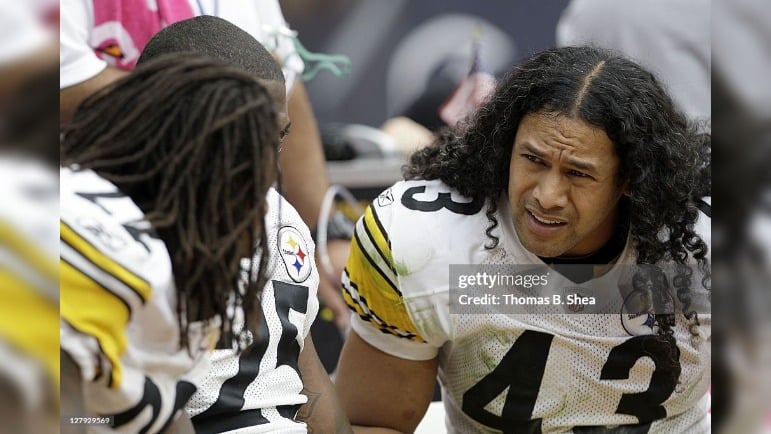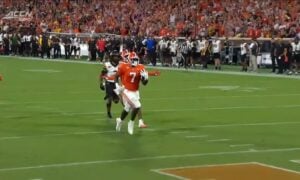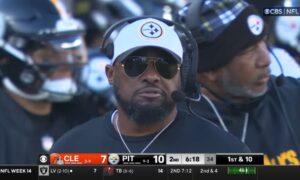Former Pittsburgh Steelers safety Troy Polamalu was one of the most humble players out there, and despite having a Hall of Fame career and being one of the best defensive players in NFL history, Polamalu gives his teammates a ton of credit for his success. During an appearance on Cameron Heyward’s Not Just Football podcast, Polamalu said that without learning from his teammates there was “no way” he could have been a Hall of Fame player and how being younger than most guys on the defense early in his career helped him learn the game.
“I’m guarding Hines Ward, and Hines said ‘No, no, no, you’re doing it wrong.’ You have Hall of Fame receivers telling you, ‘This is the best way to attack a receiver in the slot.’ Then you have Jerome [Bettis] saying ‘Oh, you’re a safety, well this is how you disguise, because I’m always gonna have you as somebody to block, but this is what’s hard on me.’ When you have all these people that are around you, like I said, I was the youngest. I listened. If anything man, I’m truly a student. And I had these guys man, it would’ve, there’s no way I couldn’t have been, in reality,” Polamalu said about his teammates helping him become a Hall of Fame player.
Polamalu was drafted into a defense that already had some well-established veterans, and the Steelers continued to add veterans who were older than him early in his career. Polamalu said he “loved” the knowledge guys from both sides of the ball would pour into him to help him succeed.
“I had a very unique position on the team. I was 10 guys’ younger brother and all the guys on the sidelines younger brother, and they all set me straight. They all protected me. To even add to that, Charlie Batch would talk to me after every series. Be like, ‘Oh, oh, TP this is what they’re doing,'” Polamalu said. “Everybody was pouring knowledge into me, man, and I loved it.”
Polamalu has talked a lot about how he’s a student of the game and how much studying and listening has helped him in his career. He played for a Hall of Fame coach in Bill Cowher and a Hall of Fame player as his defensive coordinator in Dick LeBeau, and Mike Tomlin might be on his way to Canton down the line. That’s a lot of football IQ and knowledge just from the coaches that was poured into Polamalu, and when you consider who he played with on defense and who was on Pittsburgh’s offense, there was a lot of veteran savvy.
Even things like Bettis telling him the best way to disguise something from an offense’s perspective helped Polamalu evolve as a player. It goes to show just how much of football is a team game, even when it comes to learning and scheming and game planning. While everyone was willing to share their information and help Polamalu grow, it also says a lot about how willing Polamalu was to taking advice.
He didn’t enter the league as a nobody — he was a first-round pick whom the team traded up to take — but he still listened and learned and added things to his game that he heard or saw from his teammates and coaches. He didn’t just rely on his physical gifts or the way he had always done things, and that ability to continually evolve and adapt also helped make Polamalu such a special player.
But even with how talented Polamalu was with his raw physicality and athleticism, his mental acuity for the game of football was up there with anybody. That stems from him being willing to listen and studying as much tape as possible to become as good as he could’ve been on the field.
While Polamalu said there’s no way he could have been a Hall of Famer without those he had around him, he embraced taking advice from his teammates. Because he did, he blended that with his raw talent and became one of the all-time greats.
Watch the full podcast below.








